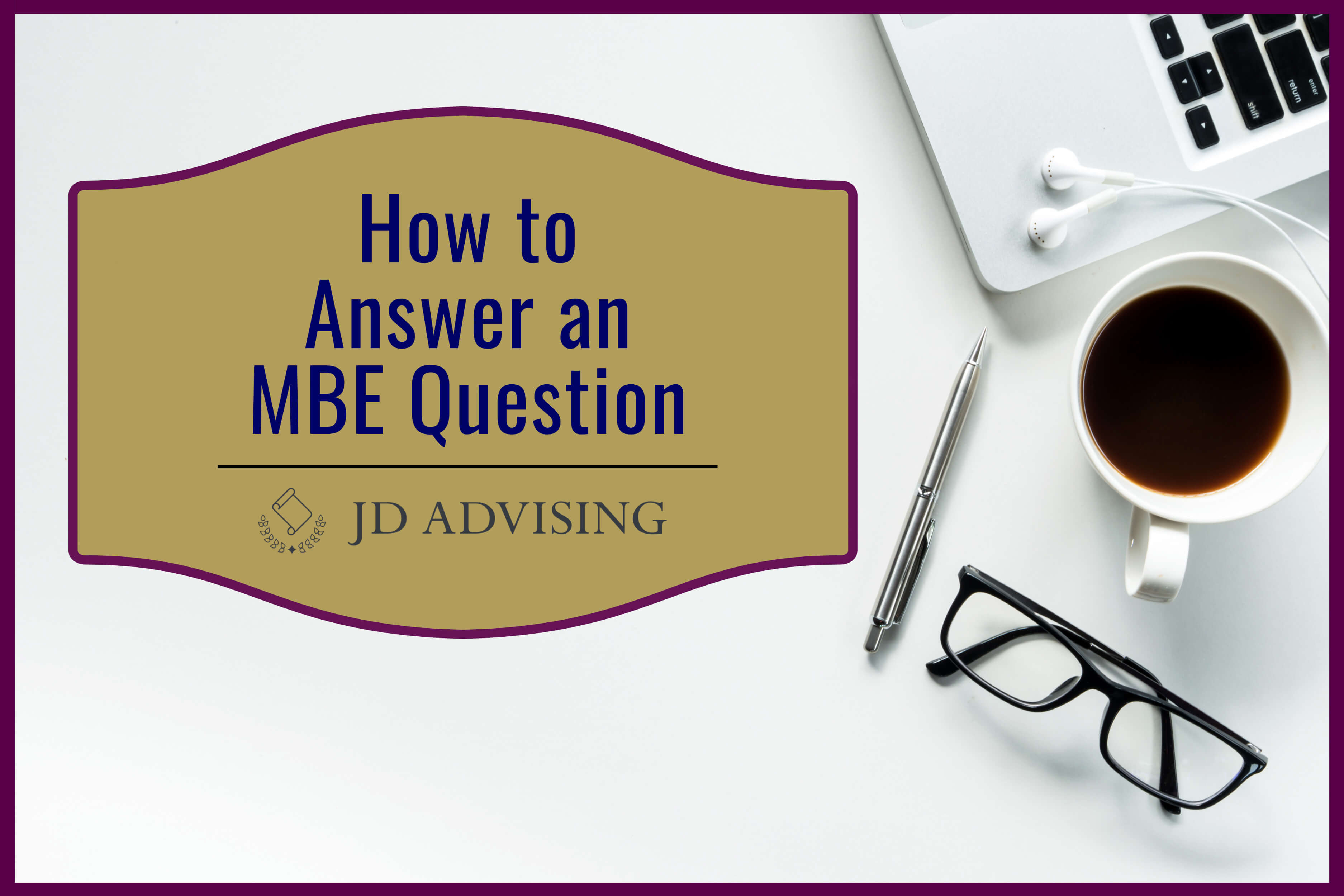Topic 4: How to Answer an MBE Question
Please see our new, most updated, free MBE Guide here!
How to Answer an MBE Question
Many students ask, what is the best way to answer multiple-choice questions? Should I read the call of the question first? Should I read the answer choices first? Here, we show you the approach for multiple-choice questions that will help you maximize your MBE score. This approach is what helped our JD Advising founder score a 180 on the MBE and it has helped countless JD Advising students boost their MBE scores significantly.
This approach will help you “dissect” MBE questions when you practice. It takes a while to answer an MBE question, but you will see your score improve if you answer questions slowly and methodically to start. If you have been frustrated and “stuck” at the same MBE score, it is worth it to step back and try this method.
The “skill” of answering MBE questions
Answering MBE questions is a skill. Many examinees rush through MBE questions to try to get through as many as possible in hopes that they will see their score improve. However, if you want to see your MBE score improve, it makes much more sense to slow down, dissect questions, understand exactly how they are written, and then start to speed up.
If you wanted to get better at painting, one way to approach it would just be to paint 100 canvases in a row as fast as you could (and this is the approach many examinees take to MBE questions!). This approach often leads to frustration and anxiety. And, while you may see your painting skills (or MBE score) improve a little, you will not see any great improvement. A much better way to approach painting would be to start slowly; learn the skills you need to paint; practice painting details, contrast, etc.; then start speeding up. You will see much faster progress in your painting (and your MBE skills) if you take the latter approach. Here, we tell you how to dissect an MBE question using a slower, more methodical approach.
How to Answer an MBE Question
Here are the steps to answering an MBE question when you practice:
Step one: read the fact pattern, then the call of the question, then STOP.
Don’t start with the call of the question. In general, we don’t recommend that you read the call of the question first. Many students find that reading the call of the question first wastes time or distracts them. (Some say that they have to reread the fact pattern twice if they start with the call of the question because they are too focused on the call of the question. If you simply start with the fact pattern, you have a fresh picture of what is being tested.) Reading the call of the question won’t likely provide very much framework for what subject you are being tested on, and you should be able to discern the subject being tested from the fact pattern anyway. If you really find it beneficial to start with the call of the question, it is okay to do so—especially if you don’t find that it distracts you or leads to timing issues. It is just not our general recommendation.
Do not look at the answer choices first! If you find yourself glancing at the answer choices, try covering them up as you go through practice questions. Many wrong answer choices are written to intentionally trick you. You might read an answer choice that sounds good, and then you are susceptible to misreading the fact pattern in a way that points you toward your pre-determined answer choice. Also, some answer choices might correctly state the law, but they aren’t relevant to the given facts; you won’t know whether they are relevant until after you read the facts!
Step two: identify the subject.
Which subject is being tested (Civil Procedure, Constitutional Law, Contracts, Criminal Law and Procedure, Evidence, Real Property, or Torts)? Figuring out the subject being tested is the second step.
Step three: identify the legal issue being tested.
For example, if it is a Real Property question, is this an adverse possession issue? Future covenants issue? Easement by prescription issue? Being able to identify the legal issue is crucial.
Step four: state the rule.
State the legal rule applicable to the issue you identify in step #3. When you are practicing, it may be helpful to write this rule down to see how well you can recite it. If you can’t remember the actual rule, look it up in your outline and then write it down so that you are more likely to remember it the next time you encounter a similar question!
Note: If you struggle with identifying the applicable issue and legal rule, you may need to spend more time memorizing your outlines and the rules before completing more practice questions. For tips on how to memorize your outlines, see this post.
Step five: answer the question without looking at the answer choices.
Without looking at the answer choices, answer the call of the question based on the rule that you just stated. Answering the question before reading the answer choices will prevent you from picking a deceptive answer that is intended to trick you. If you find that you need to look at the answer choices to discern the applicable law being tested by a question, you may need to spend more time memorizing your outlines and the laws.
Note: Some MBE questions are written in such a way that you have to look at the answer choices to answer the question. In general, however, we do not recommend you do this if you can avoid it.
Step six: find the correct answer choice.
Read the answer choices and select the answer choice that comes to the correct conclusion based on the law(s) you just identified.
Step seven: review the incorrect answer choices.
Read the other answer choices and explain why each one is incorrect. This will help you to feel more confident in your answer choice. And, it will test whether you really know the law.
This approach should take a long time for each question (5–10 minutes). But that’s okay. When you are completing practice questions, your goal should be to learn the law, not to simply answer as many questions as possible. Using this approach, you might only answer 10 practice multiple-choice questions each day and that’s okay! When it is time to take the actual test, the degree to which you know the law is more important than the number of practice questions you did! We have some students that complete 300 questions and pass the MBE with flying colors. Then, we hear of others that complete 5,000 MBE questions and fail. Quality is more important than quantity.
How to Dissect an MBE Question: An Example Problem
Let’s apply the above approach to a practice question. We recommend you try it on your own and then review the steps below.
MBE practice question
An explosives manufacturer contracted with a fireworks company in a signed writing for the sale of 100 red, white, and blue-themed fireworks, 50 of them to be delivered on June 1 and the remaining 50 to be delivered on July 1. The agreement did not specify where the delivery would take place or when payment was due. On June 1, the explosives manufacturer delivered 49 fireworks and explained that one of the fireworks unexpectedly suffered water damage but that a replacement would be delivered within two days.
Which of the following states the rights and duties of the fireworks company?
(A) The fireworks company is entitled to accept any of the 49 fireworks, reject the rest, and cancel the contract for the remaining fireworks due on July 1.
(B) The fireworks company is entitled to accept any number of the 49 fireworks and reject the rest, but may not cancel the contract as to any fireworks due on July 1.
(C) The fireworks company must accept the 49 fireworks, but it may cancel the rest of the contract for the remaining fireworks due July 1.
(D) The fireworks company must accept the 49 sets and is not entitled to cancel the rest of the contract.
Dissecting the MBE practice question
Step one: read the fact pattern, then the call of the question, then STOP.
An explosives manufacturer contracted with a fireworks company in a signed writing for the sale of 100 red, white, and blue-themed fireworks, 50 of them to be delivered on June 1 and the remaining 50 to be delivered on July 1. The agreement did not specify where the delivery would take place or when payment was due. On June 1, the explosives manufacturer delivered 49 fireworks and explained that one of the fireworks unexpectantly suffered water damage but that a replacement would be delivered within two days.
Which of the following states the rights and duties of the fireworks company?
Step two: identify the subject.
This is a Contracts question.
Step three: identify the legal issue being tested.
If it is not readily apparent, take cues from the call of the question. The call of the question tells us to focus on the fireworks company, which is the buyer in this case. Here, the buyer did not receive all of the products that it contracted to buy. Therefore, the issue is the buyer’s rights and duties when the seller breaches.
Step four: state the rule.
This is a contract for the sale of goods (fireworks), therefore the UCC will apply.
Under the UCC, the seller must deliver perfect tender, or exactly what the parties contracted to buy/sell (the “perfect-tender rule”). If the seller fails to deliver perfect tender, the buyer has three options:
- reject all of the goods,
- accept all of the goods, or
- accept however many units he wants and reject the rest.
However, there is a special rule for installment contracts (i.e., any contract that authorizes or requires delivery in separate lots to be separately accepted). If the parties have an installment contract and the seller fails to deliver perfect tender, the buyer can only reject an installment when the nonconformity substantially impairs the value of that installment AND the nonconformity cannot be cured.
Step five: answer the question without looking at the answer choices.
To refresh your memory, the call of the question is: Which of the following states the rights and duties of the fireworks company?
Now apply the rules stated above (perfect tender, installment contracts, buyer’s right to accept/reject) to the facts in the fact pattern. Here, the seller failed to deliver perfect tender because he only delivered 49 of the 50 fireworks in the first shipment. However, the seller indicates that a replacement will be delivered within two days. This is an installment contract, so the buyer can only reject the installment if the nonconformity substantially impairs the value of the installment. One missing unit out of a 50-unit delivery is not likely a substantial impairment.
Furthermore, even if there was a substantial impairment, the buyer cannot reject the goods if the nonconformity can be cured. Here, the seller already has assured the buyer that the nonconformity can be cured promptly.
Therefore, the buyer cannot reject the goods. He must accept the 49 units delivered and cannot cancel the contract.
Step six: find the correct answer choice.
Read the answer choices and select the one that best matches the conclusion you reached in step five.
(A) The fireworks company is entitled to accept any of the 49 fireworks, reject the rest, and cancel the contract for the remaining fireworks due on July 1.
(B) The fireworks company is entitled to accept any number of the 49 fireworks and reject the rest, but may not cancel the contract as to any fireworks due on July 1.
(C) The fireworks company must accept the 49 fireworks, but it may cancel the rest of the contract for the remaining fireworks due July 1.
(D) The fireworks company must accept the 49 sets and is not entitled to cancel the rest of the contract.
Here, (D) is the correct answer. It perfectly states the conclusion articulated in step five (i.e., the buyer must accept the 49 delivered units and cannot cancel the remainder of the contract).
Step seven: review the incorrect answer choices.
Explain why the other answer choices are incorrect.
When you are completing practice questions, this last step will really help you understand the nuances of the law, which are frequently tested in multiple-choice questions! Let’s look at each of the other answer choices and explain why each is incorrect.
- (A) The fireworks company is entitled to accept any of the 49 fireworks, reject the rest, and cancel the contract for the remaining fireworks due on July 1.
This would be true pursuant to the perfect-tender rule, but the perfect-tender rule does not apply to installment contracts. Therefore, this is incorrect.
- (B) The fireworks company is entitled to accept any number of the 49 fireworks and reject the rest, but may not cancel the contract as to any fireworks due on July 1.
While it is true that the fireworks company may not cancel the contract, the first half of this answer choice, again, is an option under the perfect-tender rule, which does not apply here.
- (C) The fireworks company must accept the 49 fireworks, but it may cancel the rest of the contract for the remaining fireworks due July 1.
The fireworks company may not cancel the contract. That is not part of the rule statement we identified in step five regarding installment contracts.
 Important Next Step
Important Next Step
We recommend that if you do not know the law or if you answer an MBE question incorrectly, that you write down the law you didn’t know or why you answered the question wrong on a separate notepad. Then, keep reviewing this notepad. You will constantly be exposed to the law that you previously did not know. And, you may see “patterns” in areas of law you need to work on memorizing. This is a fantastic way to see improvement in your MBE score.
Some students simply read the answer explanation and hope that they remember it for the future. The problem with just reading the answer explanation is that you are learning so much law, you will surely forget what you learned if you don’t review it! Consistently reviewing the law that you do not know is a great way to commit it to memory.
The Advantages of “Dissecting” MBE Questions
There are several advantages to using a slow and methodical plan to dissect MBE questions. Here, we list some of the advantages:
- First, it will help you learn the rules. By challenging yourself to state the rule every time you see an MBE question, you will learn the rules that much better.
- Second, it will keep you engaged. This is a very “active” and organized way of approaching the MBE. You are less likely to suffer fatigue or lose your concentration.
- Third, you will start to understand how MBE questions “work.” You could read theory about MBE questions all day, but if you answer them slowly and methodically, you will begin to intuitively understand how they are written and how to approach them.
- You will find yourself getting tricked less often. By using a step-by-step approach to MBE questions, you will avoid the common traps and red herrings that trick most students.
- It will decrease stress and anxiety. Students that race through several MBE questions a day often never see any true score improvement. This leads to a vicious cycle of answering questions, feeling stressed out, then answering more questions and feeling even more stressed out when they get the same score. By slowing down, you will see score improvement and thus decrease stress.
- It will help you improve your timing. It seems counter-intuitive, but by going through questions slowly and methodically, your timing actually will improve! We have seen countless students improve their timing on the MBE. They find themselves quickly and confidently dissecting MBE questions rather than feeling lost.
- Lastly, it is the best way to efficiently approach the MBE. You are not just going through the motions. Rather, you are taking an organized and methodical approach. This is truly the best way to spend your time!
A Note on Timed Exams
During the real MBE, you will not be going through questions this slowly. This approach is to help you improve your score when you practice. So, it is important to incorporate timed exams into your study schedule as well. Do not ignore timing! We recommend you incorporate both “dissecting” MBE questions as well as timed exams into your MBE practice. However, when you are just starting out, use this method rather than worrying about timing.
Go to the next topic, Topic 5: Civil Procedure on the MBE: Key Topics.
Seeking MBE Assistance?
Seeking MBE Assistance?
- 📘 MBE Guide: Equip yourself with our FREE expert-crafted bar exam and MBE guides.
- Free Bar Exam Resource Center: Discover top resources, articles, and free webinars led by renowned bar exam professionals.
Top Resources as Vouched by our Students:
- MBE One-Sheets: One of our most highly acclaimed bar exam supplements!
- Bar Exam Outlines: Our comprehensive and condensed bar exam outlines present key information in an organized, easy-to-digest layout.
- MBE Private Tutoring: Opt for personalized, effective strategies.
- On Demand Bar Exam Course: Comprehensive bar exam preparation.
- Bar Exam Crash Course and Mini Outlines: Acclaimed and effective for a quick refresher.
- MBE Mastery Class, Real MBE Questions, and MBE Guide: Elevate your MBE preparation with these high-quality MBE supplements!
🔥 NEW! Check out our Repeat Taker Bar Exam Course and get introduced to our unmatched platinum Guarantee Pass Program.







Leave a Reply
Want to join the discussion?Feel free to contribute!